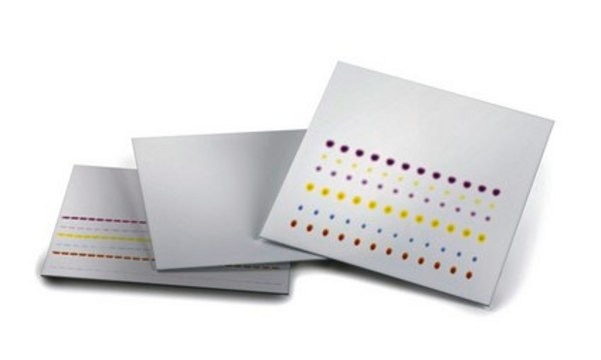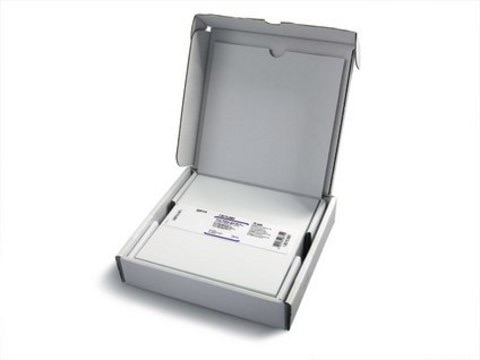1.05728
TLC plates, Cellulose F
pkg of 50 plates, plate L × W 20 cm × 10 cm, glass support
Synonym(s):
Cellulose Thin Layer Chromatography Plates
Sign Into View Organizational & Contract Pricing
All Photos(1)
About This Item
UNSPSC Code:
41115711
NACRES:
NB.21
Recommended Products
material
cellulose matrix
glass support
Quality Level
feature
binder Organic Polymer
fluorescent indicator
packaging
pkg of 50 plates
technique(s)
thin layer chromatography (TLC): suitable
layer thickness
80-120 μm
plate L × W
20 cm × 10 cm
storage temp.
2-30°C
Related Categories
General description
50 Glass plates 10 x 20 cm
Our cellulose plates are used to analyze polar substances. An organic sorbent, cellulose is perfect for separating hydrophilic substances by partition chromatography. Typical applications include the analysis of amino acids, carbohydrates, and phosphates as well as nucleic acid and nucleic acid derivatives. We offers cellulose plates in two grades: TLC for conventional and HPTLC for demanding, high-performance separations.
Linkage
Replaces: 5728-6; 5728
Analysis Note
Layer thickness: 80 - 120 µm
Deviation of layer thickness per plate: ≤ 30 µm
Aminoacid test
hRf-values
- L-serine, amino acid test:
20 - 30
- L-threonine, amino acid test: 29 - 36
- L-alanine, amino acid test: 30 - 40
- L-methionine, amino acid test: 49 - 60
- L-phenylalanine, amino acid test: 59 - 70
- L-leucine, amino acid test: 66 - 76
Typical value determined on a plate
Eluent: 1-Butanol/ acetone/ acetic acid/ water (35/35/7/23 v/v/v/v) twice developed
Deviation of layer thickness per plate: ≤ 30 µm
Aminoacid test
hRf-values
- L-serine, amino acid test:
20 - 30
- L-threonine, amino acid test: 29 - 36
- L-alanine, amino acid test: 30 - 40
- L-methionine, amino acid test: 49 - 60
- L-phenylalanine, amino acid test: 59 - 70
- L-leucine, amino acid test: 66 - 76
Typical value determined on a plate
Eluent: 1-Butanol/ acetone/ acetic acid/ water (35/35/7/23 v/v/v/v) twice developed
Certificates of Analysis (COA)
Search for Certificates of Analysis (COA) by entering the products Lot/Batch Number. Lot and Batch Numbers can be found on a product’s label following the words ‘Lot’ or ‘Batch’.
Already Own This Product?
Find documentation for the products that you have recently purchased in the Document Library.
Our team of scientists has experience in all areas of research including Life Science, Material Science, Chemical Synthesis, Chromatography, Analytical and many others.
Contact Technical Service



